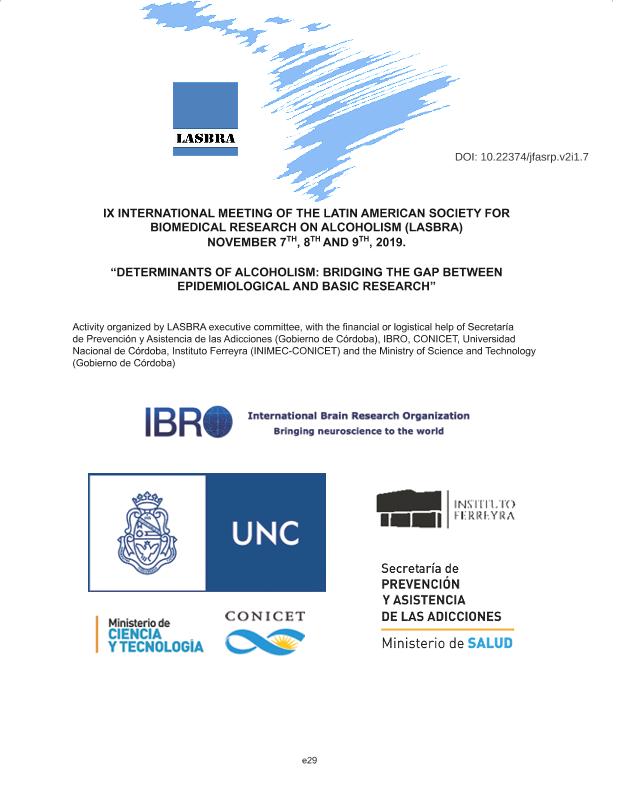Mostrar el registro sencillo del ítem
dc.contributor.author
Caneto, Florencia

dc.contributor.author
Pilatti, Angelina

dc.contributor.author
Pautassi, Ricardo Marcos

dc.date.available
2022-06-14T10:20:17Z
dc.date.issued
2019
dc.identifier.citation
Effect of impulsivity, risk taking and cognitive bias on alcohol use in children and adolescents; IX International Meeting of the Latin American Society for Biomedical Research on Alcoholism; Córdoba; Argentina; 2019; e62-e62
dc.identifier.uri
http://hdl.handle.net/11336/159647
dc.description.abstract
The present study examined the association of trait and behavioral impulsivity, risk taking and cognitive bias on frequency and quantity of alcohol in children and adolescents. Participants were children and adolescents (n = 90; M age = 14.34 SE = .17; 50% female) that took part in a larger longitudinal study (N = 1762; M age = 12.59 SE = .03; 45.7% male) were they completed the UPPS-P, a 5-factor measure of trait-like impulsivity. Participants with the highest (i.e., superior quartile) and the lowest (i.e., inferior quartile) scores on the UPPS-P were invited to participate in the present study. Participants completed a paper-and-pencil survey measuring sociodemographic variables and alcohol drinking (drinking frequency and quantity) and three computerized tasks to assessed risk taking (Balloon Analogue Risk Task [BART]), response inhibition (Go Stop Task) and cognitive bias towards alcohol signals (Emotional Stroop).Participants completed the tasks in individual sessions. Results of bivariate correlations showed that age, lack of premeditation (one of the fve dimensions of trait-like impulsivity), and risk taking were signifcantlypositively associated with frequency of alcohol use; while only age was signifcantly associated with quantity alcohol use. We conducted a hierarchical regression analyses I including age and trait-like impulsivity inthe frst step and risk-taking, response inhibition and cognitive bias included in the second step. For frequency of alcohol drinking as the dependent variable, all these variables explained 47% of the variance. Age, traitlike impulsivity and risk-taking had a signifcant positive effect on frequency. For drinking quantity as the dependent variable, only age and trait-like impulsivity was signifcantly positively associated with greater alcohol use (R 2 = .29). Altogether, these fndings failed to fnd a robust effect of multiple measures of impulsivity on underage drinking, particularly drinking quantity. This is probably related to the low prevalence of drinking behaviors at this early age. Notably, trait-like impulsivity and risk taking had a signifcant effecton drinking frequency even after controlling or chronological ager; suggesting these variables are relevant to discriminate and identify children and adolescents at greater risk for engaging in alcohol use.
dc.format
application/pdf
dc.language.iso
eng
dc.publisher
Dougmar Press
dc.rights
info:eu-repo/semantics/openAccess
dc.rights.uri
https://creativecommons.org/licenses/by-nc-sa/2.5/ar/
dc.subject
ALCOHOL
dc.subject
CHILDREN
dc.subject
ADOLESCENTS
dc.subject
IMPULSIVITY
dc.subject.classification
Otras Psicología

dc.subject.classification
Psicología

dc.subject.classification
CIENCIAS SOCIALES

dc.title
Effect of impulsivity, risk taking and cognitive bias on alcohol use in children and adolescents
dc.type
info:eu-repo/semantics/publishedVersion
dc.type
info:eu-repo/semantics/conferenceObject
dc.type
info:ar-repo/semantics/documento de conferencia
dc.date.updated
2022-06-02T19:45:39Z
dc.journal.volume
2
dc.journal.number
1
dc.journal.pagination
e62-e62
dc.journal.pais
Canadá

dc.journal.ciudad
Dundas
dc.description.fil
Fil: Caneto, Florencia. Universidad Nacional de Córdoba. Instituto de Investigaciones Psicológicas. - Consejo Nacional de Investigaciones Científicas y Técnicas. Centro Científico Tecnológico Conicet - Córdoba. Instituto de Investigaciones Psicológicas; Argentina
dc.description.fil
Fil: Pilatti, Angelina. Universidad Nacional de Córdoba. Instituto de Investigaciones Psicológicas. - Consejo Nacional de Investigaciones Científicas y Técnicas. Centro Científico Tecnológico Conicet - Córdoba. Instituto de Investigaciones Psicológicas; Argentina
dc.description.fil
Fil: Pautassi, Ricardo Marcos. Consejo Nacional de Investigaciones Científicas y Técnicas. Centro Científico Tecnológico Conicet - Córdoba. Instituto de Investigación Médica Mercedes y Martín Ferreyra. Universidad Nacional de Córdoba. Instituto de Investigación Médica Mercedes y Martín Ferreyra; Argentina
dc.relation.alternativeid
info:eu-repo/semantics/altIdentifier/url/http://www.jfasrp.com/index.php/JFASRP/article/view/7
dc.conicet.rol
Autor

dc.conicet.rol
Autor

dc.conicet.rol
Autor

dc.coverage
Internacional
dc.type.subtype
Reunión
dc.description.nombreEvento
IX International Meeting of the Latin American Society for Biomedical Research on Alcoholism
dc.date.evento
2019-11-07
dc.description.ciudadEvento
Córdoba
dc.description.paisEvento
Argentina

dc.type.publicacion
Journal
dc.description.institucionOrganizadora
Latin American Society for Biomedical Research on Alcoholism
dc.description.institucionOrganizadora
Universidad Nacional de Córdoba. Instituto Ferreyra
dc.source.revista
Journal of Fetal Alcohol Spectrum Risk and Prevention
dc.date.eventoHasta
2019-11-09
dc.type
Reunión
Archivos asociados
